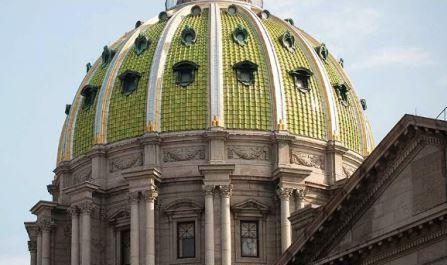HARRISBURG – With the number of positive COVID-19 cases steadily decreasing on a daily basis and medical experts testifying that communities can safely meet the challenges of the new reality, the Senate on Wednesday approved a four-bill package that would give county governments more control over reopening their local economies and provide waivers from the governor’s closure order for a variety of businesses — if they can operate in a manner that protects employees and customers, according to Senate President Pro Tempore Joe Scarnati (R-25) and Senate Majority Leader Jake Corman (R-34).
Senate Bill 327, House Bill 2388 and House Bill 2412 now return to the House of Representatives for concurrence on Senate amendments.
House Bill 327 goes to the governor’s desk for enactment into law. The package of bills would bring back over 200,000 jobs across the Commonwealth.
Prior to final passage, Senate Bill 327 was amended in the Senate Rules & Executive Nominations Committee by Scarnati to give county governments the option to develop and implement individual plans to mitigate the spread of COVID-19 and safely reopen their local economies.
The bill gives counties the authority to develop plans to reopen industries shuttered by the governor’s statewide closure order, only if they comply with CDC and state Department of Health employee safety guidelines.
“We are by no means completely abandoning the mitigation steps that are in place. This outbreak is not over. However, we need to look to the future and establish a clear recovery process for the Commonwealth,” Scarnati said.
“This process should not be dictated from the top down, but rather be a collaborative effort that relies on the expertise of our local officials. They know their communities and as such they should play a major role in the recovery process.”
During a Wednesday morning joint public hearing of the Senate Aging & Youth and Local Government committees on the safety of vulnerable populations and counties’ ability to reopen safely, Dr. Steven Shapiro, chief medical and scientific officer, and Dr. Donald Yealy, chair of emergency medicine, from UPMC said reopening is feasible for many areas as long as mitigation efforts are maintained and appropriate steps are taken to protect vulnerable populations.
Senate Bill 327 also includes a COVID-19 emergency regulatory tolling provision that would require any regulation not finally approved or disapproved to be suspended in place until 90 days after the emergency order is lifted. Additionally, the bill creates a COVID-19 cost and recovery task force.
While Senate Bill 327 addresses the governor’s closure order on a county-wide basis, two bills in the package focus on reopening specific markets and services to meet the demands of consumers – provided that the businesses can adhere to the social distancing practices and other mitigation measures as outlined by the CDC and state Department of Health employee safety guidelines, according to Corman.
House Bill 2388 would require the Department of Community and Economic Development (DCED) to issue waivers to the Governor’s Business Closure Order to vehicle dealers, lawn and garden centers, cosmetology salons, barber shops, messenger and agent services, animal grooming services and manufacturing operations. House Bill 2412 provides for waivers for legal services and real estate sales activities.
“The governor’s waiver process was an unmitigated disaster: no clarity, no consistency, no transparency and no accountability. Real estate and vehicle sales are life-sustaining. Small businesses that are the heart of Pennsylvania’s communities were forced to close, while nearby big box stores providing the same products remained open. That is unfair,” Corman said.
“These bills allow for the reopening of certain businesses and services with the key caveat that they must follow state and federal guidelines to protect their workers and their customers.”
The fourth bill in the package, House Bill 327, would permit the sale of prepared beverages and mixed drinks for off-premise consumption during the COVID-19 disaster emergency by those possessing a valid restaurant or hotel liquor license.
The measure is intended to provide relief for licensees that have lost more than 25 percent of their average monthly sales, including alcohol sales, as a result of the emergency.



